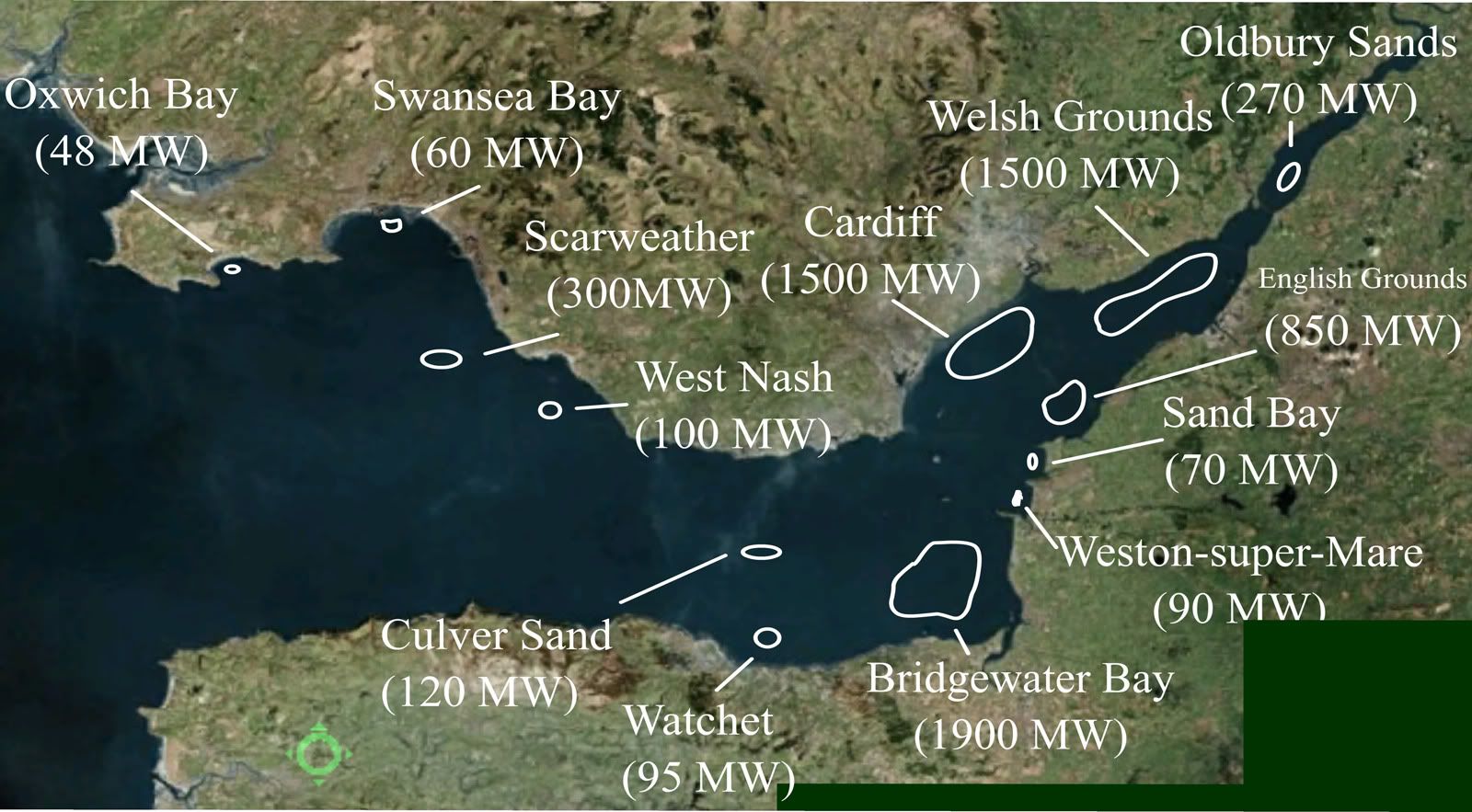At Plaid's Spring Conference last weekend I had a short chat with Dafydd Elis-Thomas. As any regular reader of this blog will know, I've been very critical of Dafydd because of the lies he told about Plaid's policy on nuclear power in the leadership campaign, but I'm not the sort of person who would say anything about him on this blog that I wouldn't say to his face. I owed him that. Though, as you might imagine, he didn't react too well.
He gave jobs as his main reason for being in favour of a new nuclear power station at Wylfa B, to which I said that the plans for renewable energy off the coast of Ynys Môn could provide jobs without the need for a new nuclear power plant. He thought I was talking about the Gwynt y Môr offshore windfarm, but I was in fact talking about the plans for the Round 3 Irish Sea Zone. This is set to produce seven or eight times the power that will be produced by Gwynt y Môr, and will in fact produce more electricity than the old Wylfa power station ever did. Dafydd told me in no uncertain terms that I was talking complete rubbish, that it would take at least twenty years for those windfarms to be built, and that a new power station at Wylfa was the only realistic hope for jobs on the island.
So let's look at the facts in more detail.
In terms of electricity produced, the present Wylfa power station has an installed capacity of 980 MW which would mean it could produce 8,585 GWh/yr if operated continuously. But, like any power station, it cannot be operated continuously. Averaged over its lifetime Wylfa has only operated at 56% of that capacity, producing an average of about 4,800 GWh/yr.
The Irish Sea Zone will comprise a series of windfarms with an installed capacity of about 4,200 MW. Even if we use a conservative capacity factor of 35% these windfarms will produce about 12,877 GWh/yr. Half as much again as Wylfa produced even when running flat out, and more than two-and-a-half times what Wylfa produced on average. As originally presented, the rationale behind the UK's nuclear programme was to replace the capacity of the UK's existing nuclear power stations when they came to the end of their working life. These Irish Sea Zone windfarms will easily replace the capacity of Wylfa ... and much more.
In terms of timescale, the Round 3 contracts were allocated in January 2010. There are two Round 3 Zones off the coast of Wales. The one in the Irish Sea (Zone 9) was awarded to Centrica, and the one in the Bristol Channel (Zone 8) to RWE npower. I have to say that RWE have been rather quicker out of the blocks than Centrica. They have come up with a firm proposal for what they have called the Atlantic Array and will submit it for planning approval this year. If approved, they hope it will be completed by 2016.
Centrica is running a little further behind. The latest information can be accessed from this page, and they are still at the stage of identifying suitable sites within the zone, but they plan to submit a proposal for approval in 2013. However there was a major announcement last week, which would indicate that things will now move forward at a pace.
Dong Energy splashes out £40m on Centrica’s Irish Sea offshore wind plan
Dong Energy is one the major players in wind energy, and is 76% owned by the Danish government. They wouldn't buy into the project unless they were convinced it was a positive investment based on the work Centrica has been doing to establish the viability of specific sites within the zone. Essentially the project has moved from investigation and feasibility to a concrete project, which they have called the Celtic Array.
If things now move forward at the same pace as with the Atlantic Array, we should be looking at something which will be producing electricity in 2017 or 2018. The idea that it would take at least twenty years was either wishful thinking on the part of someone who wanted nuclear energy at any cost, or misinformation.
In terms of jobs, this is what RWE say on their website about how many jobs will be created for the Atlantic Array in the Bristol Channel:
Current estimations suggest that 3,000 people would be employed during the construction phase of the wind farm through all levels of the supply chain. In addition, around 200 full time positions would be created in order to maintain the wind farm over its operational life of 25 years.
The Atlantic Array will have an installed capacity of 1,500 MW. The Celtic Array will be almost three times larger and therefore provide work for maybe 8,000 in the construction stage and 500 on a permanent basis. That certainly compares very favourably with the estimates for how much work would be created by a new nuclear power station at Wylfa.
But the other factor is that hundreds of people will have to be employed for many decades to come simply decommissioning the current nuclear power station and making it safe. Jobs in the nuclear industry in north west Wales are assured for many years into the future even if a new nuclear power station at Wylfa isn't built.
-
So on three counts—the electricity produced, the jobs created and the timescale on which it can be brought into operation—the Celtic Array is a far better option for the energy needs of Wales and for the economic prosperity of Ynys Môn than building a new power station at Wylfa. That's without mentioning the safety issues surrounding nuclear, the unbudgeted costs of decommissioning and long-term storage of nuclear waste, the uninsurability of the risks, and the possibility that any commercial operator will go bust leaving future taxpayers with the problem of paying to clean up the mess for centuries to come.
-
Today, E.ON and RWE have announced that they are pulling out of the Wylfa B project. Yes, that's the very same RWE that is steaming ahead with its investment in the Atlantic Array off our southern coast. RWE have finally realized that Wylfa B is a bad investment that is unlikely to realize a profit, but the story with renewables is completely different.
The UK Government is obviously bitterly disappointed. They were elected on a manifesto commitment to allow nuclear power stations to be built "provided that they receive no public subsidy". But they have been consistently breaking that promise with hidden, backdoor subsidies, as a select committee made up of a majority of their own MPs reported only last year.
It should now be obvious to them that the subsidies they were trying to sneak in were still not enough. The UK Government will of course be looking for a new operator to take over the project, but if E.ON and RWE can't make a profit out of Wylfa B what on earth makes them think that any other operator will be able to do it? The commercial risks are too great. They always were. I'm not aware of any nuclear power station that has been built on a commercial basis without extensive public subsidy.
The Welsh Government is left looking like a bunch of fools. Only a couple of weeks ago they made a U-turn on their 2011 manifesto commitment that we in Wales can produce all the electricity we need from renewables and therefore had no need for nuclear. I guess they were just trying to be cute. They obviously thought that Wylfa B would be forced on us irrespective of whether they approved or not; but they didn't want to be seen as losers, switched horses at the last minute, and are now lying face down in the turf. Ample proof that if you ditch your principles, you'll be the one that ends up in the ditch. See ... I learnt something from a weekend at Ffos Las!
-
My answer to today's news is simple. Let Wylfa die the death it should have died years ago. It is an expensive and potentially dangerous way of producing electricity that Wales simply doesn't need, and it will land future generations with an ongoing bill for centuries to come.
It's important that Wales is self-sufficient in electricity. It's important that Ynys Môn has employment and is economically prosperous. It's important that we back a project that can be providing that energy, those jobs and that prosperity within a few years.
The Celtic Array ... or Wylfa B? No contest.







